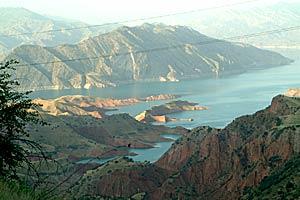-
Our work
-
Fields of work
- Arms control
- Border management
- Combating trafficking in human beings
- Conflict prevention and resolution
- Countering terrorism
- Cyber/ICT Security
- Democratization
- Economic activities
- Education
- Elections
- Environmental activities
- Gender equality
- Good governance
- Human rights
- Media freedom and development
- Migration
- National minority issues
- Policing
- Reform and co-operation in the security sector
- Roma and Sinti
- Rule of law
- Tolerance and non-discrimination
- Youth
- Field operations
- Projects
-
Meetings and conferences
- Summit meetings
- Review Conferences
- Ministerial Council meetings
- Plenary meetings of the Permanent Council
- Plenary Meetings of the Forum for Security Co-operation
- Security Review Conferences
- Annual Implementation Assessment Meetings
- Economic and Environmental Forum
- Economic and Environmental Dimension Implementation Meetings
- Human rights meetings
- Media conferences
- Cyber/ICT security conferences
- Conference of the Alliance against Trafficking in Persons
- Gender equality conferences
- Annual OSCE Mediterranean conferences
- Annual OSCE Asian conferences
- Partnerships
-
Fields of work
-
Countries
- All
-
Participating States
- Albania
- Andorra
- Armenia
- Austria
- Azerbaijan
- Belgium
- Belarus
- Bosnia and Herzegovina
- Bulgaria
- Canada
- Croatia
- Cyprus
- Czechia
- Denmark
- Estonia
- Finland
- France
- Georgia
- Germany
- Greece
- Holy See
- Hungary
- Iceland
- Ireland
- Italy
- Kazakhstan
- Kyrgyzstan
- Latvia
- Liechtenstein
- Lithuania
- Luxembourg
- Malta
- Moldova
- Monaco
- Mongolia
- Montenegro
- The Netherlands
- North Macedonia
- Norway
- Poland
- Portugal
- Romania
- Russian Federation
- San Marino
- Serbia
- Slovakia
- Slovenia
- Spain
- Sweden
- Switzerland – OSCE Chairpersonship 2026
- Tajikistan
- Türkiye
- Turkmenistan
- Ukraine
- United Kingdom
- United States of America
- Uzbekistan
- Asian Partners for Co-operation
- Mediterranean Partners for Co-operation
-
Structures and institutions
- Chairpersonship
-
Secretariat
- Secretary General
- Office of the Secretary General
- Conflict Prevention Centre
- Transnational Threats Department
- Office of the Special Representative and Co-ordinator for Combating Trafficking in Human Beings
- Office of the Co-ordinator of OSCE Economic and Environmental Activities
- Gender Issues Programme
- Opportunities for Youth
- Department of Human Resources
- Department of Management and Finance
- Office of Internal Oversight
- Documentation Centre in Prague
- Institutions
-
Field operations
- Presence in Albania
- Centre in Ashgabat
- Programme Office in Astana
- Programme Office in Bishkek
- Mission to Bosnia and Herzegovina
- Programme Office in Dushanbe
- Mission in Kosovo
- Mission to Moldova
- Mission to Montenegro
- Mission to Serbia
- Mission to Skopje
- Project Co-ordinator in Uzbekistan
- Closed field activities
- Parliamentary Assembly
- Court of Conciliation and Arbitration
- Organizational structure
- About us
Expansion of the CSCE/OSCE

Beautiful lake scenery of the Norak Dam, south of the Tajik capital, Dushanbe, July 2004.
30-31 January 1992: At the second Council of Ministers meeting, ten former Soviet Republics are welcomed as participating States, and the Office for Free Elections becomes the Office for Democratic Institutions and Human Rights.
At the Second Meeting of the Council of Ministers on 30-31 January 1992 in Prague, ten States that were formerly part of the Soviet Union were welcomed as CSCECSCE
Conference on Security and Co-operation in Europe participating States.
The Ministers welcomed Armenia, Azerbaijan, Belarus, Kazakhstan, Kyrgyzstan, Moldova, Tajikistan, Turkmenistan, Ukraine and Uzbekistan, following the receipt of letters accepting all CSCE commitments and responsibilities from each of them.
Ten new participating States
The admission of these ten new participating States followed the formal dissolution of the Soviet Union into its constituent republics at the end of 1991.
The three Baltic states of Estonia, Latvia and Lithuania, also formerly part of the Soviet Union, had already become participating States at an Additional Meeting at Ministerial Level in Moscow on 10 September 1991.
On 24 March 1992, three more countries - Croatia, Georgia and Slovenia - were also admitted as participating States at the First Additional Council of Ministers Meeting in Helsinki.
Since that time, the OSCE has continued to expand, with the most recent country to become a participating State being Serbia and Montenegro (then the Federal Republic of Yugoslavia), which joined on 10 September 2000.
Office for Free Elections becomes ODIHR
The Ministers also decided in Prague to give additional functions to the Office for Free Elections, which was renamed the Office for Democratic Institutions and Human Rights (ODIHR).
The new functions of ODIHR included:
- Serving as an institutional framework for sharing and exchanging information that would assist the new democracies in their institution-building;
- Facilitating contacts between those offering such resources and those wishing to make use of them;
- Developing co-operation with the Council of Europe in order to make use of its database of such resources and services;
- Establishing contacts with non-governmental organizations active in the field of democratic institution-building, with a view to enabling interested participating States to make use of their extensive resources and expertise;
- Facilitating co-operation in training and education in disciplines relevant to democratic institutions;
- Organizing meetings and seminars among all participating States on subjects related to the building and revitalization of democratic institutions.